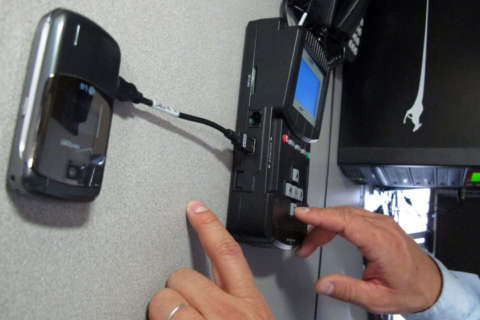WASHINGTON — Maryland State Police have begun to chip away at a backlog of digital evidence, and new funds have started flowing that could help the agency and other police departments around the state move faster on investigations into child sexual abuse.
Digital evidence from phones and computers touches all types of crimes, from homicides to financial fraud. But it is especially prominent in cases of child abuse, as smartphones have become a way for predators to connect with, groom and abuse their young victims.
Smartphones played key roles in two recent child abuse cases that shocked the region: Deonte Carraway and Carlos Bell, teaching assistants who victimized dozens of the students under their charge at schools in Prince George’s and Charles counties, respectively.
A WTOP investigation exposed a chronic backlog of digital evidence across Maryland — a tsunami of data waiting to be scrutinized by highly specialized technicians. Last summer, the backlog at the state police’s digital crime lab was 10 months.
Charles Tucker, an attorney representing one of Carlos Bell’s victims, said he’s elated to hear that more funding is now available to help police scrutinize the digital evidence faster.
“Unfortunately for the victims in the Bell case, it’s too late for them,” Tucker said.
Evidence on Bell’s cellphone languished for months, unseen by police, caught up in that backlog. When a state police analyst finally began to comb through the phone’s files, investigators in Charles County had enough evidence to quickly arrest Bell. But six months had passed since the phone was seized, and during that time, Bell victimized another eight children.
Bell was charged in Charles County with abusing or exploiting 42 children. Last month, he pleaded guilty to more than two dozen charges. He faces a lifetime behind bars when he is sentenced this spring.
“There’s a lot of other individuals out there like Bell waiting to be discovered and found, if only we can get through this backlog,” Tucker said.
New grant funding should help reduce the backlog, said Lt. Matthew Kail, who oversees the state police digital crime lab as the technical investigations section commander.
“The state police is putting more resources toward this,” Kail said.
“We are doing a lot of different things right now to move forward in this area — to hopefully get our backlog down and examine evidence in a more timely manner,” he said.
The agency plans to use roughly $771,000 in grant funds to pay for new equipment, including specialized computers with exceptional processing power and software — and the extra equipment will allow analysts to process twice as much evidence, Kail said.
The backlog, Kail said, is currently less than 10 months. But state police officials said that right now, it could take anywhere from four to 10 months to analyze the evidence in pending cases, depending on the type of case and the amount of data involved.
Kail said they also plan to hire a public affairs officer, whose primary job would be to help educate children and parents about the dangers that lurk on the internet and through social media.
The new funding comes from Alicia’s Law. Passed in 2016, the Maryland law provides $2 million in grant funding annually for police departments to investigate and prevent child sexual abuse.
The money became available in the fall for the first time.
The remaining Alicia’s Law funding was divvied up among 18 other government agencies, non-profits and police agencies, including the Charles County Sheriff’s Office, which received a $28,000 grant that will help cover overtime for investigators.
“We need to work these tips as quickly as possible.” said Capt. Stephen Salvas of the Charles County Sheriff’s Office. “When you’re working something and you get to the end of the shift, this is going to allow detectives to continue working these tips without having to pause and come in the following day.”
The Center for Children, a nonprofit that works with the victims of child abuse in Charles County, received almost $52,000. The money will pay for training and for developing strategies to assist in investigations and prosecutions related to crimes involving children and the internet.
“The rest of the funds will be used to train forensic interviewers, victim service staff, and mental health professionals on how to best serve child victims of indecent images and to provide victims and high-risk children with online safety education training,” said executive director Catherine Meyers.
Although the $2 million in funding is included in Gov. Larry Hogan’s budget proposal for next year, no bills have been filed that would increase the grant funding laid out in Alicia’s Law. Lawmakers still have some time, however, to file bills this session.
Waiting for action
Families whose lives have been hurt by Bell are looking to school officials to make changes that will ensure a healthy and safe learning environment; they’re also looking to state lawmakers to address the same issues statewide, said Tucker.
“There has to be some kind of action. The children need it. The families want it,” he said. “We’re just waiting for the legislators to do their jobs and craft something that make sense.”
So far this session, legislators in both the House and the Senate have filed multiple bills that would address child sexual abuse.
Cases like Carraway and Bell, and others in Montgomery County are fueling legislative momentum in Annapolis, said Del. Eric Luedtke, a Montgomery County Democrat who chairs the House Education Subcommittee.
“Those situations have pointed to flaws in how we prevent child abuse and how we deal with incidents of child abuse once they come to light. And I think that’s driving some of the reforms we’re seeing,” he said.
Pending legislation includes the following:
- Senate Bill 131 would mandate training for teachers, doctors and others who are required by law to report suspected child sexual abuse.
- Under Senate Bill 132, those mandatory reporters could face a misdemeanor charge for failing to report suspected abuse as required by law. Currently, Maryland has no penalty.
- House Bill 301 would allow evidence from a sex offender’s past victims to be given during criminal trials in order to demonstrate a pattern of abuse or assaults.
- House Bill 251 would require a school sex education curriculum to cover the concept of consent.
Many of the bills have been introduced in past years but failed to garner enough support to make it to the governor’s desk.
“Our state needs to step up and do more to protect our kids against abuse and neglect,” said Sen. Susan Lee, D-Montgomery County, who is sponsoring two of the bills.
“We’re just trying to help the children. We’re trying to protect them from some of these egregious acts, of those individuals who take advantage of them and abuse and neglect them.”








